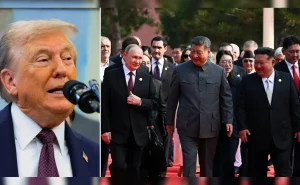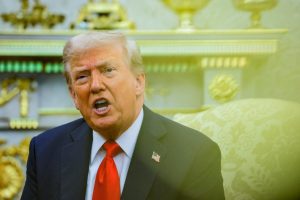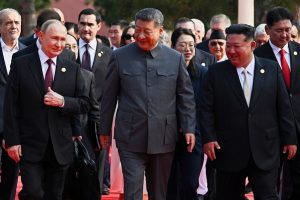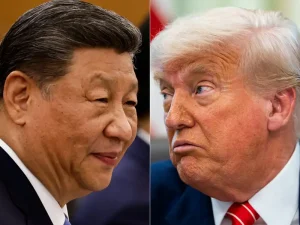Washington D.C. – President Donald Trump delivered a significant trump ww2 comment following China’s elaborate ceremony marking the 80th anniversary of World War Two’s conclusion. Speaking from the Oval Office, Trump expressed disappointment that China failed to acknowledge America’s crucial role in defeating Japan during what he described as a “beautiful ceremony.”
The trump ww2 comment came hours after Trump suggested on social media that foreign leaders gathering in Beijing might be conspiring against the United States, highlighting growing tensions between the world’s two largest economies.
Trump’s Assessment of Beijing Ceremony

Trump praised the visual spectacle of China’s anniversary commemoration while simultaneously criticizing its content. His trump ww2 comment reflected both admiration and frustration: “I thought it was a beautiful ceremony. I thought it was very, very impressive,” the President told reporters.
However, Trump’s appreciation quickly turned to criticism as he elaborated on his trump ww2 comment. “I watched the speech last night. President Xi is a friend of mine, but I thought that the United States should have been mentioned last night during that speech, because we helped China very, very much,” he stated emphatically.
The ceremony featured Chinese President Xi Jinping addressing more than 50,000 spectators at Tiananmen Square, accompanied by Russian President Vladimir Putin and North Korean leader Kim Jong Un in a display of solidarity among nations often at odds with Washington.
Historical Context of American Assistance


Trump’s trump ww2 comment highlighted America’s substantial contribution to China’s war effort against Japanese forces. The United States entered World War Two in 1941, providing crucial aid to Chinese forces battling Japanese military occupation. Japan’s invasion of China in 1937 had marked a major escalation that eventually led to the broader global conflict.
The American role proved decisive in Japan’s ultimate defeat in 1945, marking the war’s end. Trump’s trump ww2 comment underscored this historical reality, suggesting that China’s failure to acknowledge American assistance represented a significant diplomatic oversight.
Xi Jinping’s Strategic Messaging


Chinese President Xi Jinping used the anniversary ceremony to advance his political narrative about China’s rise under Communist Party leadership. Xi has positioned World War Two as a pivotal moment in what he terms the “great rejuvenation of the Chinese nation,” now governed by his administration and its international allies.
During Wednesday’s ceremony, Xi thanked “foreign governments and international friends who supported and assisted the Chinese people,” according to official statements. However, he avoided specific mention of the United States’ role, prompting Trump’s pointed trump ww2 comment about the omission.
Also Read: Trump On India Ceasefire Credit Dispute Fuels Bold 50% Tariff War; Reports
The ceremony served multiple purposes for Xi’s government, showcasing China’s military capabilities while demonstrating solidarity with Russia and North Korea against Western influence.
Military Display and International Presence
The Beijing ceremony featured an impressive military parade with goose-stepping troops and advanced military equipment designed to deter potential adversaries, including the United States. This display of military might provided context for Trump’s trump ww2 comment about the ceremony’s broader implications.
The presence of Vladimir Putin and Kim Jong Un alongside Xi Jinping sent a clear message about emerging geopolitical alignments. These leaders reviewed China’s military capabilities in a demonstration that directly relates to current international tensions.
Trump’s Social Media Provocations
Even as Trump delivered his measured trump ww2 comment to reporters, his social media activity revealed deeper frustrations. In a post directed at Xi Jinping on Truth Social as the parade commenced, Trump wrote: “Please give my warmest regards to Vladimir Putin, and Kim Jong Un, as you conspire against the United States of America.”
The Kremlin responded to these accusations by denying any conspiracy and suggesting Trump’s remarks were ironic, though the comments reflect genuine concerns about growing cooperation among these nations.
Current US-China Relations Context


Trump’s trump ww2 comment occurs amid particularly tense US-China relations. The two nations face disagreements on numerous security issues, including the Ukraine conflict and South China Sea disputes. Both countries are also engaged in complex trade negotiations aimed at preventing escalating tariff battles.
Despite these tensions, Trump has consistently emphasized his personal relationship with Xi Jinping, believing this connection can guide both economies toward more constructive engagement. Trump has indicated potential for future meetings with the Chinese leader.
Implications for Diplomatic Relations
The trump ww2 comment raises questions about how historical narratives influence contemporary diplomacy. Trump’s criticism suggests that acknowledgment of past cooperation remains important for current bilateral relations, even amid broader strategic competition.
China’s decision to exclude specific mention of American assistance while highlighting other international support may reflect deliberate diplomatic positioning rather than historical oversight. This omission, highlighted by trump in his ww2 comment, demonstrates how historical interpretations continue shaping modern geopolitical relationships.
The incident illustrates ongoing challenges in US-China diplomacy, where symbolic gestures and historical acknowledgments carry significant weight in determining future cooperation possibilities.

